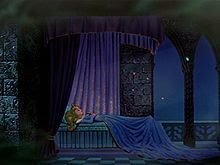While critics have expressed irritation at the solipsism and self-centredness of the protagonist in Elizabeth Gilbert's popular memoir "Eat Pray Love," there is some enlightenment to be found in her journey. Initially impatient with her self-indulgent episodes I began to feel sympathy for the woman. If nothing else, she was good at expressing how it feels to be in pain, and how lost one can feel at the bottom of that particular well of loneliness.
So I began to give her the benefit of the doubt, and isn't that the beginning of faith? She began the book on the road of The Sinner, with a big hole inside her that she tried to fill with Italian food. This sojourn comforted her for a while, but fortunately she had planned to move to India to feed her soul as well. This is where she embarked on the path of spiritual growth, the path of Moonchild, The Adventurer.
Here's what I found interesting. It describes her discovery of the meaning of free will versus fate and how this can develop into faith. The task she describes is the essential task of The Adventurer, to exercise will, to control one's thoughts, if you like, rather than have them control you.
We gallop through our lives like circus performers balancing on two speeding side-by-side horses – one foot is on the horse called "fate," the other on the horse called "free will."
....I can choose my words and the tone of voice in which I speak to others. And most of all, I can choose my thoughts.
This last concept is a radically new idea for me... This is a power you can cultivate. If you want to control things in your life so bad, work on the mind. That's the only thing you should be trying to control. Drop everything else but that. Because if you can't learn to master your thinking, you're in deep trouble forever.
On first glance, this seems a nearly impossible task. Control your thoughts? Instead of the other way around? But imagine if you could? This is not about repression or denial. Repression and denial set up elaborate games to pretend that negative thoughts and feelings are not occurring... instead admitting to the existence of negative thoughts, understanding where they came from and why they came they arrived, and then – with great forgiveness and fortitude – dismissing them. This is a practice that fits hand-in-glove with any psychological work you do during therapy... Of course this all takes practice and effort... It's constant vigilance
Sometimes we forget that the discussion of free will is actually about that joyous concept called freedom. By examining and controlling our thoughts we are exercising our freedom to be self-determining. In Eat Pray Love Elizabeth Gilbert says, "I need to do it, for my strength. Devo farmi le ossa is how they say it in Italian. 'I need to make my bones'."
Do we not make our own soul?
"The true God is the God within us," is how Robert M. Wallace says it in the first chapter of his as yet unpublished book to be found on his website http://www.robertmwallace.com where you will also find chapters from his book "Hegel's Philosophy of Reality, Freedom and God." The personal growth that we achieve by travelling the various paths through the dreams of The Sleeping Beauty is a kind of destructive creation similar to that described by the philosopher Hegel. Embracing contrition we create forgiveness. By controlling our thoughts we create our freedom. By exercising and examining our inner life we admit God within us, though God is beyond everything. This is a kind of faith, perhaps you could say it's a philosopher's faith in a philosopher's God.
Curiously, once your life is transformed by this faith, something takes over. One day my psychiatrist told me, "Just be." That was the answer to my question about what the end result of my therapy should be, how I should live once I had defeated my depression and my mental illness. So what I now realise, and have yet to achieve, is that through exploring freedom one discovers faith and beyond faith one just is. With no need for belief, the answer is just to be yourself. This is probably when you come close to knowing the God within you, your soul, and acting for your soul in the external world you are, I guess, someway toward living in harmony with what Christians call God's will, or what a philosopher might call transcendence.
The above quoted works are copyright of their respective authors and are quoted on the basis of fair use.



No comments:
Post a Comment